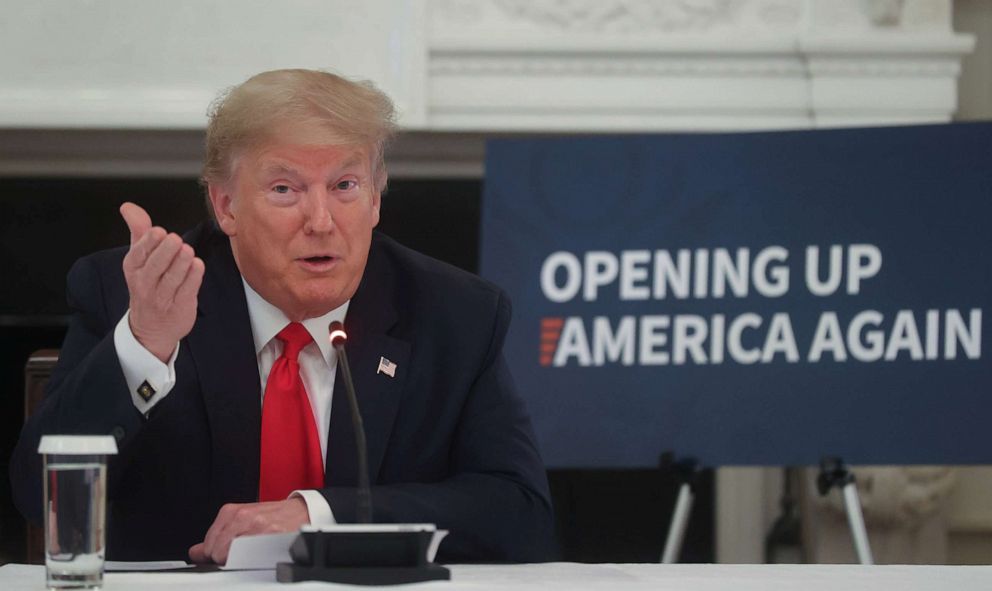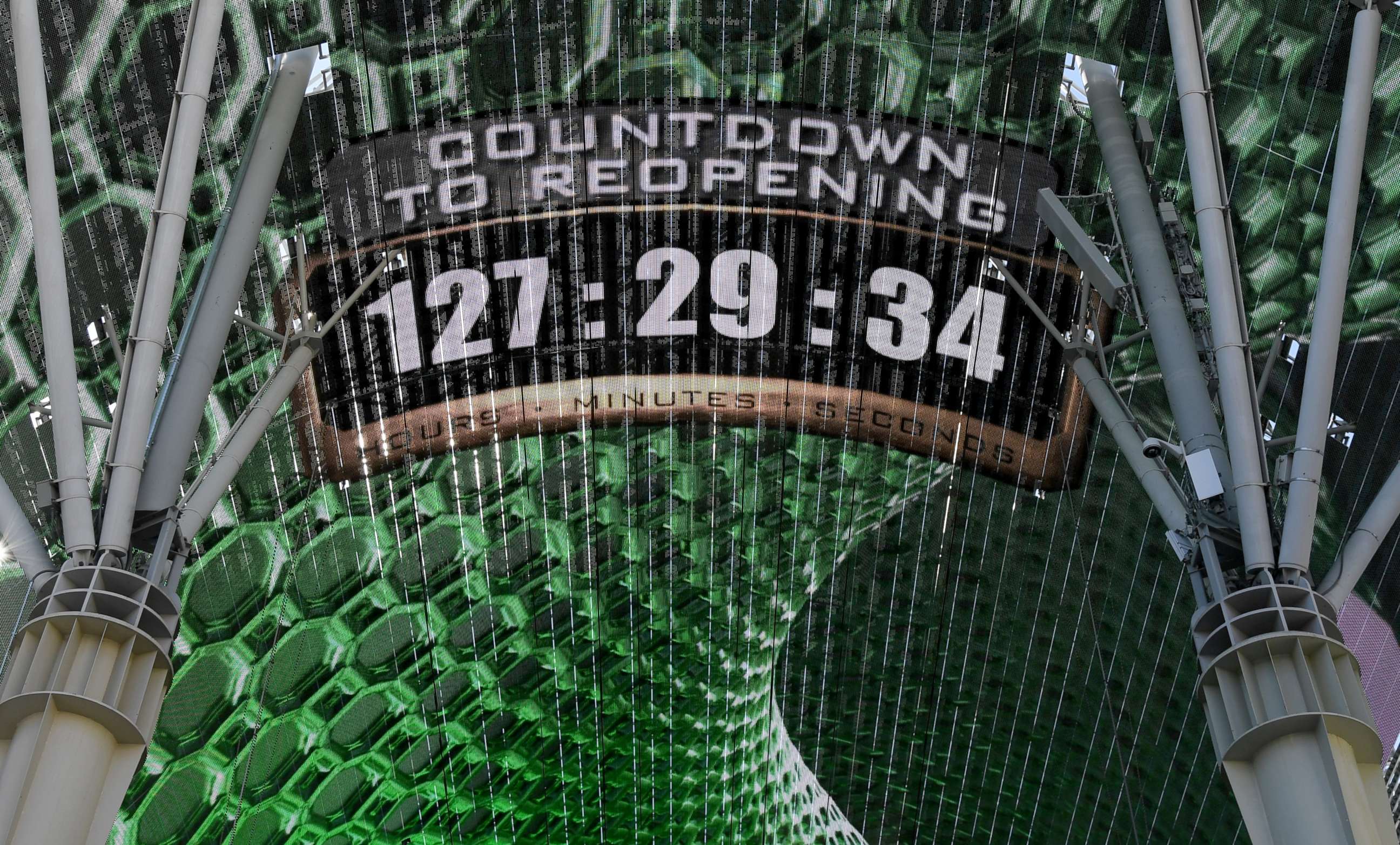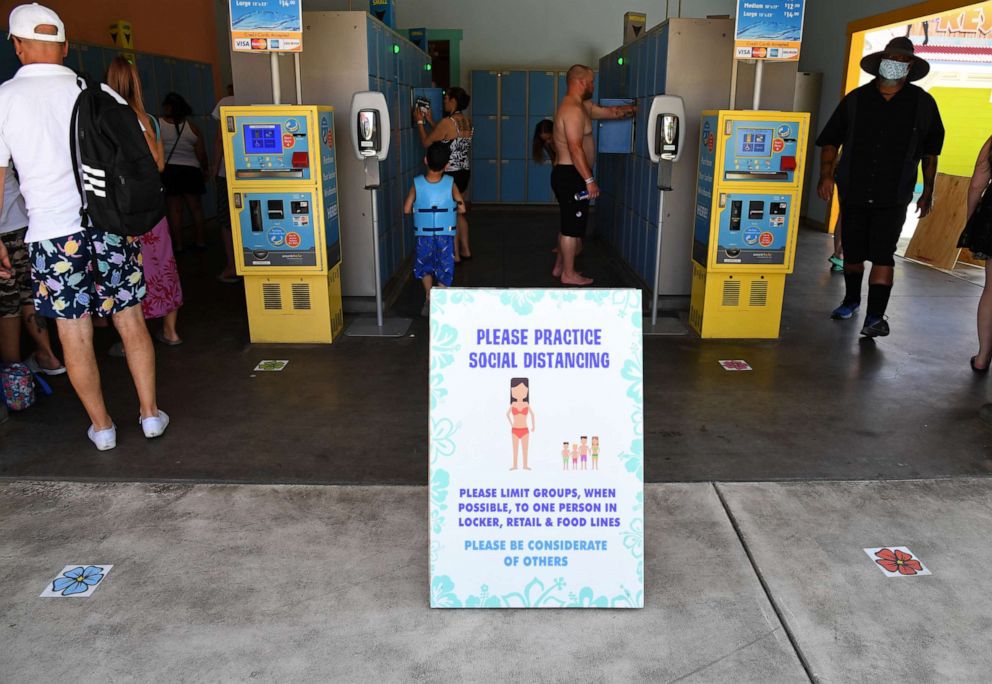Hesitancy to resume activities marks reopening challenges: POLL
Nearly 6 in 10 are unready to resume pre-pandemic activities.
With two-thirds of Americans worried about a second wave of the coronavirus, a new ABC News/Washington Post poll finds nearly 6 in 10 people are unready to resume their pre-pandemic activities, underscoring continued public unease as the nation seeks a return to normalcy.
Impacts of the pandemic are vast. Seventy-nine percent in this national survey say their lives have been disrupted. Fifty-nine percent report severe economic impacts in their community -- up from 43% two months ago. Among those employed before the pandemic began, 24% have been laid off or furloughed.
See PDF for full results, charts, and tables.
For all that, 57% say it's more important to try to control the spread of the virus than to try to restart the economy. And as states move to reopen, most people are hesitant. Asked if they're willing at this time to go to stores, restaurants and other public places the way they did before the pandemic, 58% say it's too early for that.
That result reflects concerns about becoming infected. Sixty-three percent remain very or somewhat worried they or someone in their immediate family may catch the coronavirus. (It was 69% in late March.) And 68% in this poll, produced for ABC News by Langer Research Associates, are worried about a possible second wave of infections.
Greater worries are associated with reluctance to resume normal activities. Among people who are very worried about a second wave – 1 in 3 Americans – 91% say it's too early to return to public places as they did before the pandemic. Reluctance also is higher among people living in counties with more diagnosed cases, among other groups.
Worries rise in some groups. Eighty-one percent of Hispanics and 75% of blacks are worried they or a family member might catch the disease, for example, compared with 58% of whites.
Further demonstrating the extent of the pandemic, 42% of Americans now know someone personally who has been diagnosed with COVID-19, up nearly fourfold from 11% in late March. That rises to 54% among blacks and the same among those in the Northeast. It also peaks among higher-income and more-educated adults, possibly reflecting disparities in health care access.

Employment/Economy
Work loss is a pervasive impact of the crisis. Among Americans who were working full or part time before the pandemic, 24% report that they're now unemployed or furloughed without pay. (Additionally, among those who were previously working full time, 10% are now on part time.)
Job losses and furloughs peak in economically vulnerable groups, including 41% among women without college degrees, 36% among people with household incomes less than $50,000 a year and 32% among racial and ethnic minorities. Those compare with 2 in 10 whites, 17% of people earning $50,000 or more and 16% of college graduates.
While work losses differ among groups, there's broad agreement on community-level economic impacts. Sixty-one percent of blacks, 60% of whites and 54% of Hispanics all report severe economic impacts of the coronavirus outbreak on their community. So do 56% to 62% across regions of the country and roughly 6 in 10 in cities and suburbs (it's lower, 49%, in rural areas). This even crosses generally sharp partisan lines: Fifty-seven percent to 63% of Republicans, independents and Democrats alike report severe economic impacts locally.

Policy
Americans give far higher marks to their state's governor's handling of the outbreak -- 66% approve -- than to President Donald Trump's (as reported Sunday, 46% approve). More than 6 in 10 approve whether the governor is a Republican (63% approval) or a Democrat (69%), and whether Americans live in areas with higher or lower infection rates.
The most popular response at the federal level is the effort to provide financial help for people in need; 57% rate the Trump administration positively in this area. In a related result, 58% support extending the current $600-per-week boost to unemployment benefits past its current expiration in July.
In addition to wide partisan and ideological differences, support for extending higher benefits peaks among less well-off groups. It's 79% among blacks and 77% among Hispanics versus 48% among whites; 66% among people with less than $50,000 incomes versus 51% among those earning more; and 65% among women versus 50% among men.
Fifty-four percent also say the administration has done an excellent or good job providing small-business loans. Positive ratings slip in two other areas -- coordinating federal and state responses (49%) and making a test available to anyone who wants it (46%).
These views are highly partisan. In terms of testing availability, for example, 81% of Republicans rate the administration positively; that drops by almost half to 42% of independents, and then by half again to 21% of Democrats. It's lower, also, in states and counties with the most cases. And it ranges from 55% in the South to 35% in the Northeast.
Groups
There are other divisions among groups, many also based on partisanship. Just 27% of Republicans say it's more important to stop the spread of the virus, even if that hurts the economy, than to try to restart the economy, even if that hurts efforts to stop the spread. By contrast, battling the spread is prioritized by 59% of independents and 81% of Democrats.
Similarly, 77% of both blacks and Hispanics put a higher priority on stopping the spread of the virus; that drops to 49% of whites. Priority on stopping the spread also is higher among lower-income Americans, and it's 66% among women versus 48% among men. It's also vastly higher, naturally, among people who are more worried about catching the disease and about a second wave.
Notably, too, people who've been laid off or furloughed nonetheless say stopping the spread is more important than restarting the economy -- by an over 2-1 margin, 64-31%.

Partisanship even relates to degrees of life disruption. Sixty percent of Democrats say their lives have been disrupted "a lot" by the pandemic, compared with 47% of independents and 39% of Republicans. Part of the reason is that major disruptions peak among blacks (at 62%) and women (55%) -- both more Democratic groups.
Many of these gaps are also reflected in willingness to resume activities. Sixty-seven percent of Republicans say they're willing to go to shops, restaurants and other public places as they did before the pandemic; that falls to 40% of independents and just 18% of Democrats. It's nearly 20 points higher among men than women, 50% versus 31%; and 48% among whites compared with 27% among racial and ethnic minorities.
Worry and experience are strong factors, as noted. Among those who are most worried about a second wave, a mere 9% are willing to resume their pre-pandemic activities now; it's 33% among those who are somewhat worried and jumps to 79% of those who are less worried. And among people in the quartile of counties with the fewest cases, 50% are willing to resume now. That drops to 29% in counties with the most diagnosed cases.
Methodology
This ABC News/Washington Post poll was conducted by landline and cellular telephone May 25-28, 2020, in English and Spanish, among a random national sample of 1,001 adults. Results have a margin of sampling error of 3.5 points, including the design effect. Partisan divisions are 31-24-37%, Democrats-Republicans-independents.
The survey was produced for ABC News by Langer Research Associates of New York City, with sampling and data collection by Abt Associates of Rockville, Maryland. See details on the survey's methodology here.




